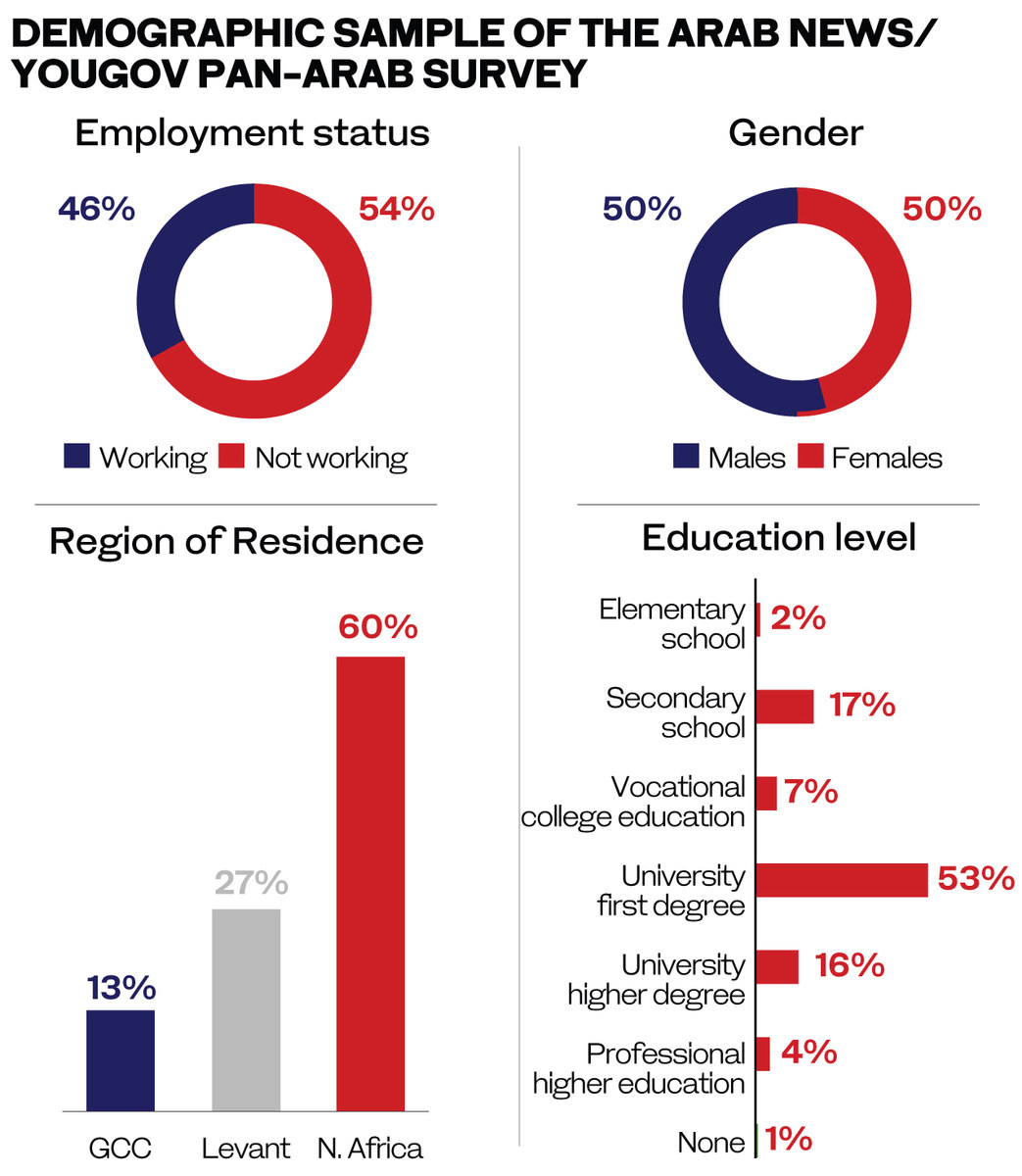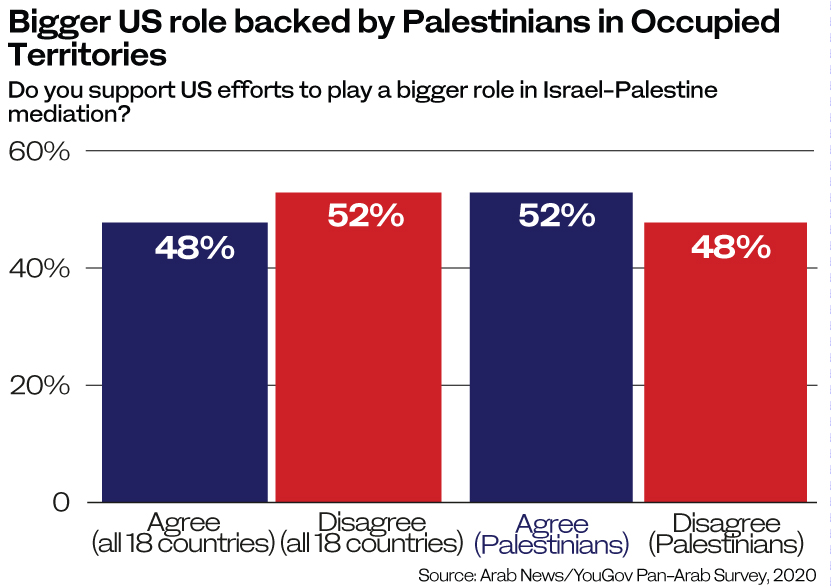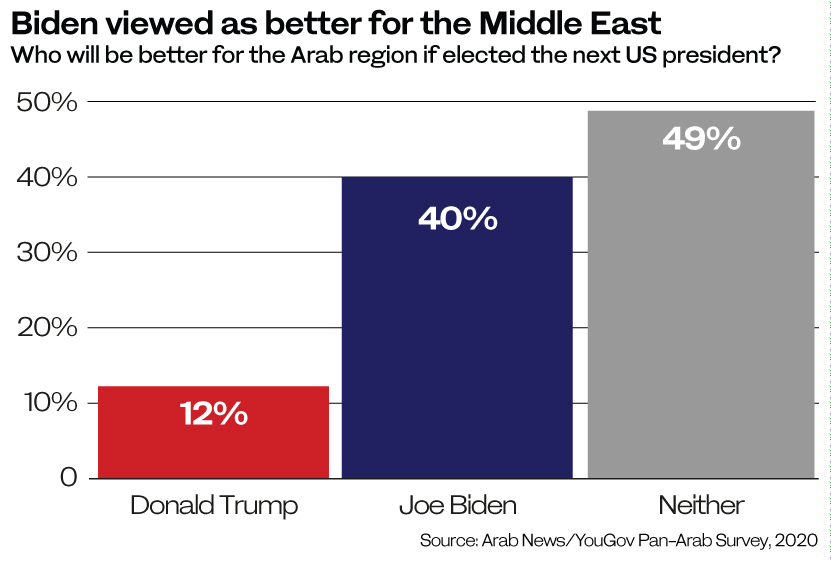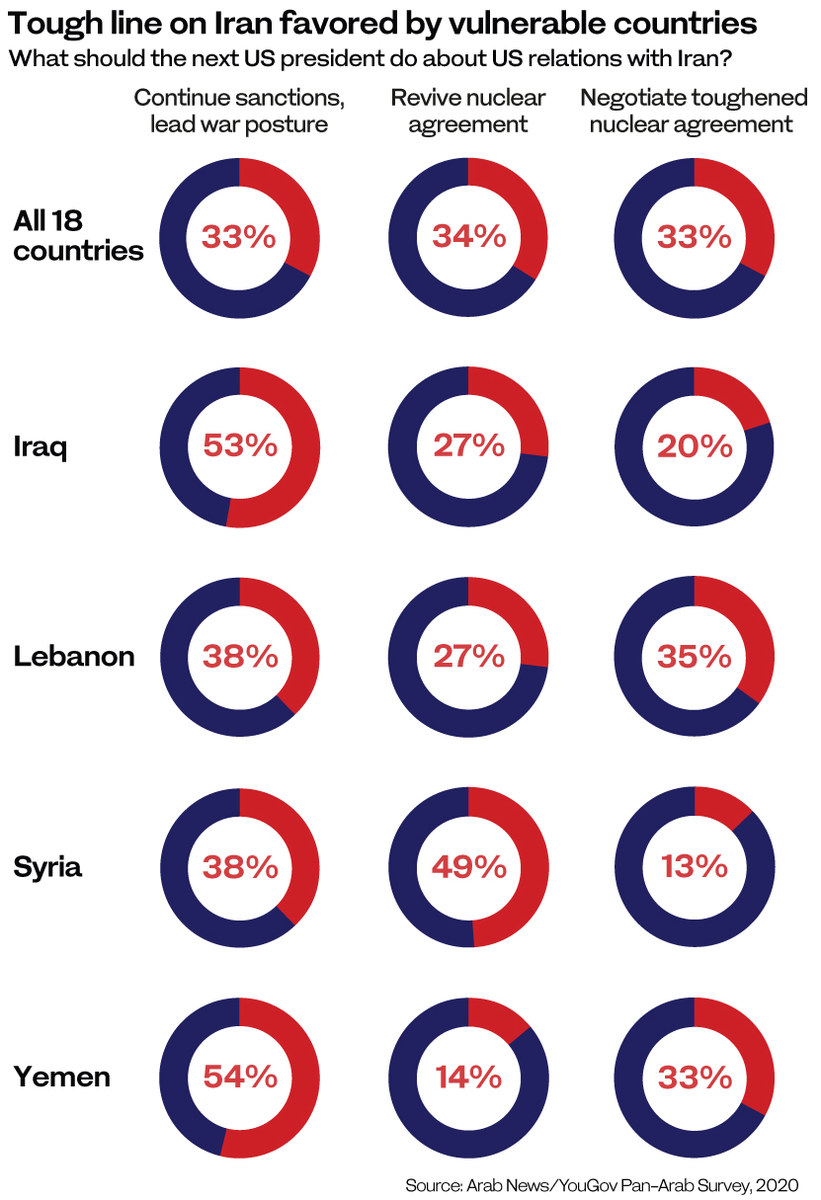LONDON: A new study conducted by Arab News and the polling firm YouGov has revealed the diverse, often surprising and at times contradictory attitudes of Arabs from across the Middle East and North Africa toward the 2020 US presidential election. From Palestine to Iran, from Obama to Trump, Arabs do not always agree, but there are some areas in which they display a striking level of unity.
On Friday, the Arabs News Research & Studies Unit hosted a virtual debate to discuss the results of the Arab News/YouGov survey on how they perceive the US and Election 2020. The event featured experts from across the US and Middle East and was moderated by Faisal Abbas, Editor in Chief of Arab News.
One of the study’s key findings is that Arabs — if forced to choose between Donald Trump and Joe Biden — would choose the latter. But this support for the Democratic nominee does not come without a caveat. A majority (58 percent) of the 3,000 respondents — adult Arabs hailing from all 18 Middle East and North African states — agreed that Biden, who served as vice president to Barack Obama until 2017, must distance himself from Obama-era policies.
That Arabs overwhelmingly view the Obama-era policies negatively is far from surprising, according to Ali Khedery, CEO of Dragoman Ventures. Arabs recognize that Obama’s foreign policy legacy in the Middle East was one of repeated failures, he said.
“If we take a quick tour of the region under Obama, you will recall that Obama intervened in Libya militarily, only to then abandon it and let it slip into a civil war and violent tribal conflict. He also abandoned (Egyptian President) Hosni Mubarak, not understanding the fact that the vacuum left would be filled by Islamists, the Muslim Brotherhood specifically.”
Khedery continued: “President Obama called Syrians — as they were trying to rise up — farmers and lawyers, and sat by and watched as (Syrian President Bashar) Assad perpetrated a genocide, an ethnic cleansing, and did nothing to stop that.”
He pointed to Iran — seen by Arabs as one of the top threats facing the US globally — as another key failure of the Obama-Biden administration, and one that Arabs are particularly cognizant of. “Obama even looked the other way while the Iranian and IRGC (Islamic Revolutionary Guards Corps) increased their influence in the region across Syria, Iraq, Lebanon, Afghanistan and Yemen,” Khedery said.

These failures, he added, were not lost on Arabs from across the region — and they do not want four more years of it.
“Overall, I’d give the Obama-Biden policy an F in the region,” Khedery said, “and so I’m not surprised that a majority of Arabs want Biden to distance himself from Obama’s legacy.”
Given Obama’s track record, it is perhaps to be expected that Arabs view Biden’s best course of action as a departure from that era’s policies. However, the Arab News-YouGov polls also revealed some surprising — and perhaps contradictory — opinions held by the region’s populace.
The Palestinian question, and what role the US should play in resolving it, supplied some of the most revealing data in the entire pan-Arab survey.
A slight majority of Palestinians polled in the occupied territories (52/48 percent) supported US efforts to play a bigger role in Israel-Palestine mediation. By the same margin, respondents from all 18 countries combined opposed the motion.

Given Washington’s undeniable superpower status, Robert Ford, former US ambassador to Syria and Senior Fellow at the Middle East Institute, said this finding should come as no surprise. “My understanding of the polling result, with respect to the Palestinians in occupied territories, is that they want help. They want American leverage over America’s friend Israel in order to secure what the Palestinians view as their just demands.”
But whether or not a Democratic presidency would deliver this is another question, he said, noting that there is a rift within the party between younger people, who support the Palestinian cause, and the traditional wing, of which Biden is a part, that is “not there yet.”
If Biden wins, “there is going to be a split between the younger people in the party, who are more to the left, and some of the more traditional Democrats, including Biden, who has already indicated, for example, that he will not use American aid to Israel in order to leverage the country.”

Looking to the future, Ford said: “I actually don't think there’s going to be a huge difference between Donald Trump and Joe Biden’s Middle East policies, I don’t think President Trump or President Biden will make the Middle East a big priority. That means America certainly will be influential in the region, but it won’t be decisive — it does not even want to be decisive.
“The US won’t leave the Middle East, but we can expect more like their Syria policy… Special operations forces and drones, that's the model for future engagement in the Middle East - on both the Trump and Biden sides.”
Dania Koleilat Khatib, Executive Director of Al-Istishari Al Strategy Center, echoed Ford’s views on the division between Palestinians and the wider Arab world. She said the poll’s findings underscore the necessary pragmatism adopted by the Palestinians, who are directly involved in the conflict, which contrasts with the idealism of Arabs from elsewhere, who have no direct stake in a resolution of the seemingly intractable conflict.
“The US is a superpower. The Palestinians know this, and they know they need them to resolve the dilemma, in order to reach a resolution,” she said.
But she added that there is another dimension at play in the Palestinian question: regional and global stability.
“The Muslim Brotherhood and Iran,” she said, “claim legitimacy by attaching themselves to the Palestinian cause, regardless of whether they care about it or not. We know they don’t care, but they claim to for legitimacy.
“So, if we solve the Israel-Palestine issue, the main source of legitimacy that these destabilizing movements rely upon will be gone. This makes resolving the conflict a prime issue for the stability of the region, and thereby for the stability of the world,” Khatib said.
Citing the significance of the Arab News-YouGov survey, she said “fact-based discussions, polls and lobbying are needed for the US to have a more balanced approach to the Israeli-Palestinian conflict.”
Khalid-Abdulla Janahi, Chairman of Vision 3, spoke on the trend of normalization of relations between Israel and Arab countries, describing the Bahraini-Israeli normalization deal –as “a long time coming.” He said Arabs should not depend on the US to resolve the conflicts of the Middle East but instead assert their rights as citizens to address them.
While Arabs were divided over some issues, one single issue was a source of overwhelming agreement: regardless of who becomes president on November 3, the US must continue Trump’s tough line on Iran.

“Containing Iran and Hezbollah” featured among the four main issues that respondents wanted the next US president to focus on. One-third of respondents in all 18 countries agreed that the US should continue its sanctions and maintain a war posture.
For Arabs and everyone else in the region, the issue of Iran “is one of the most vexing … and has been so since the 1979 revolution,” said Khedery, who served as a special assistant to five US ambassadors and advised three heads of US Central Command from 2003 to 2009.
He said that he is more optimistic about Trump’s policy on Iran than he is of Biden, because Trump “understands Iran for what it is.”
“Trump knows that there can be no peace with what is, essentially, a fascist and genocidal regime that oppresses its own people while seeking to spread the Khomeinist revolution across Arabia,” he said.
“Obama said Arabs need to learn to share Arabia with Persia; that, by definition, cannot occur. The current Iranian regime seeks to expand itself and reconstitute what used to be the Persian empire through any means necessary: terrorism, genocide and other malignant activities.”
This is why, despite the Arab preference for Biden, a second Trump term as president may in fact serve their interests better, he said.
“Trump recognizing Iran for what it is and applying maximum pressure is far superior to what Obama and Biden did, which was to live in denial of what Iran is and dealing with them for what they wished they were, as opposed to what they really are,” Khedery said.
If Biden came back into office, Khedery said, he is likely to re-enter negotiations with Iran, but in doing that Biden may inadvertently “give Iranians another lifeline to try to dominate the region.”
Speaking for YouGov, Lara Al-Barazi, Research Director of YouGov MENA, said: “Any kind of survey cannot reach everyone, so a close representation of the population is taken to mirror as close as possible what is occurring on the ground.”
The partners for Friday’s panel debate were Wayne State University, Newstalk Florida and the Center for Media and Peace Initiatives.



























